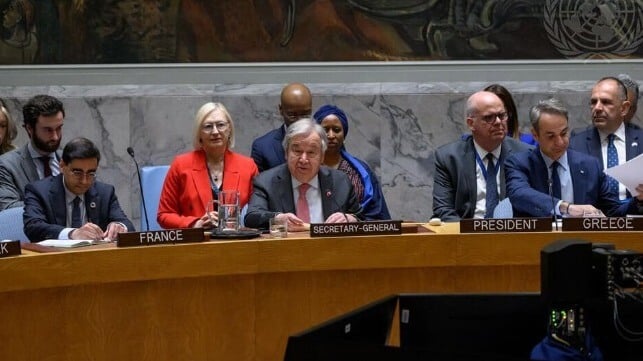UN Says Global Security Depends on Maritime Security

The Secretary General of the United Nations opened a day-long session of the Security Council discussing maritime security by calling for a greater respect for international law. Secretary-General António Guterres called for international cooperation for global stability and respect for international law to improve maritime security.
Guterres told the representatives of the largest nations that the world’s maritime routes and the people depending on them are sending a “clear SOS.” He spotlighted the Houthi attacks on commercial vessels, trafficking in the Gulf of Aden and the Mediterranean, and a myriad of crimes in the Gulf of Guinea as examples. He told the representatives that he believes the problem is getting worse.
“Without maritime security, there can be no global security,” said António Guterres. He emphasized in the opening remarks to the Security Council that the world’s oceans are increasingly under strain from threats both traditional and emerging — challenges around contested boundaries, depletion of maritime resources, escalating geopolitical tensions — and warned that “no region is spared. As threats to maritime security are becoming more complex and interconnected, enhanced coordination and stronger maritime governance are essential.”
Briefing the Security Council, the President of the Union of Greek Shipowners and Chair of the Board of the Neptune Group of Companies, Melina N. Travlos, warned that “shipping is increasingly being weaponized. Piracy,” she warned, “is evolving, not retreating.”
Highlighting the statistics on crime, Travolos stated, in 2024, there were 116 reported incidents. She said it represented a 35 percent increase for 2023. She pointed to organized crime, as well as trafficking of drugs and individuals, along with the growing threat of cyberwarfare.
During the debate, many nations took the floor to underline the importance of cooperation for global maritime security. They highlighted their individual concerns.
The United States, represented by its Acting Representative, Ambassador Dorothy Shea, used the calls for cooperation to highlight the Registry Information Sharing Compact founded by Liberia, Panama, and the Marshall Islands. She said it now includes 15 shipping registries representing more than 20 percent of the world’s flagged vessels. She said it is an important tool used for stopping flag hopping and helping to stop illicit practices, including UN Sanction Violations. She urged more registries to join the effort as a means of setting a global standard for compliance with international maritime law.
Russia’s Permanent Representative, Vassily Nebenzia, however, used the meeting as an opportunity to criticize the West and cite efforts against the shadow fleet. Russia terms the efforts of the NATO countries as the emergence of “Baltic pirates.” It said Western countries are justifying their illegal actions at sea by creating artificial impediments and threats to maritime trade.

that matters most
Get the latest maritime news delivered to your inbox daily.
He said the actions of the “newly-minted Baltic pirates and their EU cheerleaders” are a “flagrant violation of the freedom of navigation and the right of peaceful passage or transit passage.” Russia, however, asserted that most of the issues being debated, which included transnational organized crime, illicit arms trade, drug trafficking, human trafficking, illegal exploitation of marine resources, are not part of the remit of the Security Council.
Secretary-General Guterres told the representatives that action is required in three areas. He called for respecting international law. Addressing the root causes of maritime insecurity and creating a partnership at all levels. He said that the upcoming 2025 UN Ocean Conference in Nice, France, will “provide an important moment for the countries of the world to take action.”
